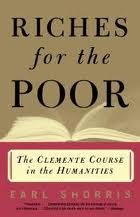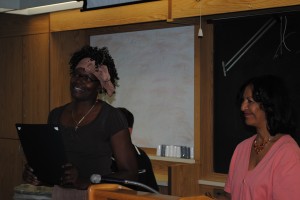Earl Shorris, social critic and educator, has died. The news of his passing won’t cause a ripple in Camden, but it should. Shorris was the founder of the Clemente Humanities curriculum designed and implemented to bring the highest level of teaching to people who had been left behind, economically and educationally. The program ultimately reached 20 cities, including Camden, where for four years the Mid-Atlantic Regional Center for the  Humanities at Rutgers-Camden offered it to groups of some several dozen Camden-area residents in cooperation with Cooper Hospital. The faculty came largely from Rutgers. The majority of the students were Cooper employees who had never had the chance to get to or through college. It was a great program, and one that highlighted both the benefits of collaboration and the true value of human investment.
Humanities at Rutgers-Camden offered it to groups of some several dozen Camden-area residents in cooperation with Cooper Hospital. The faculty came largely from Rutgers. The majority of the students were Cooper employees who had never had the chance to get to or through college. It was a great program, and one that highlighted both the benefits of collaboration and the true value of human investment.
I never met Shorris, though we exchanged emails as the Camden program evolved. The humanities program he formed in 1995 at the Roberto Clemente Guidance Center in New York’s East Village offered without charge a menu of rigorous original work in philosophy, history, and the arts. The goal was to inspire a level of critical thinking as well as self-confidence that could help unlock the barriers that make it so difficult for people of limited income to reach their full potential.
In Camden, we created our own variation of the Clemente model, taking students through 28 weeks of original readings built around the theme of American freedom. We did so not to celebrate American values so much as to understand them, including the many ways freedom was denied to the ancestors of many of the participants in the course.
The curriculum was designed by Sharon Ann Holt, MARCH’s director of programs, with funds made available from the National Endowment for the Humanities through the New Jersey Council for the Humanities. She assumed the position of director of the council earlier this year. Diane Turner, curator of the Charles Blockson Afro-American Collection at Temple University, directed the program for its last three years.
Cooper became Rutgers’ partner through Dr. Edward Viner, who was then a board member of the humanities council. He currently serves as a board member for the new Cooper Medical School. We recruited students from Cooper because they met the profile of the Clemente program. Many of them had entry positions, and they hoped with greater education to move up in the employment ranks. A good number of the students were inspired enough to enroll in college following completion of the program. Others who did not take additional courses nonetheless came away inspired by brilliant teaching and, most of all, a sense of empowerment that came from mastering difficult subjects.
Earl Shorris and his legacy are worth remembering at this time of crisis in the life of the city of Camden and the Rutgers campus there. Behind the takeover effort has been a vision that measures progress in bricks and mortar more than human welfare. Rutgers may be growing, but it doesn’t show in its physical footprint. Politicians who have judged the campus critically have failed to acknowledge its essential role in human investment and the damage a takeover would have in compromising its positive presence in one of the nation’s most beleaguered cities. Rutgers-Camden represents a major asset for human development in the city. Cooper Hospital does too. Together, they can continue to move the city to a more stable and productive role in the region. Clemente represented but one measure of their potential to work together. A hostile takeover of the Rutgers campus is hardly a way to build on that success.

1mWyGNAPRblM
I am very impressed with the Clemente program. I have been interested in collaborations for years and I believe the connections we make between different “sectors” or “strata” in society are critical not only for those you are serving for for all of us.
I believe a broader sense of education as a continuing process is needed throughout society. Simply because we have “finished” formal education does not mean we stop learning and growing, although that is often the result.
Good work. I hope to learn more about what you are doing in the future.
RWS